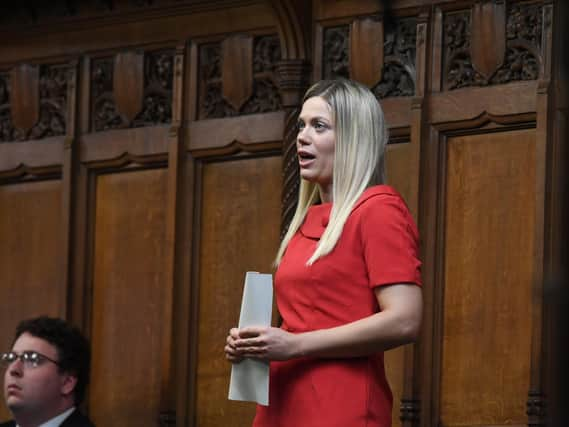'It was kind of an accident' - Penistone and Stocksbridge MP Miriam Cates on her journey into politics


From a parish councillor with no political party affiliation, to ‘Blue Wall’ Conservative MP, Ms Cates says that her speedy ascent through the political ranks - which eventually coincided 2018’s “Brexit chaos - Ms Cates told the Yorkshire Post: “I don’t regret it, but it was definitely a shift.”
In the years before her General Election victory, the trained science teacher was involved in hyper-local politics, but describes herself as getting “very fed up with Sheffield City Council” but wanting to have “some sort of positive influence”.
Advertisement
Hide AdAdvertisement
Hide Ad“I did look at all the parties because as I said at the time, I wasn’t politically aligned,” she explained.
“I saw it as a positive opportunity, partly because although I hadn’t been politically aligned before, I have always been interested in politics, right from about ten or 11.
“I remember being fascinated by it, even though none of my family have that kind of level of political interest or affiliation, but I did realise that you have to join a party to get anywhere in, in politics, even you know, at the most local level.”
Ms Cates victory over Labour candidate Francyne Johnson positioned her as a blue brick in the Red Wall, as the Conservatives took swathes of red England at the 2019 poll.
Advertisement
Hide AdAdvertisement
Hide AdThis weekend will see the party’s first opportunity to gather en masse with its members, commentators and campaigners for the first time since that victory, as the Conservative Party conference travels to Manchester, but the circumstances are now very different to the Brexit-dominated politics of two years ago.
overwhelming victory that December, but in the wake of a pandemic that has thrown economic and regional disparities into sharper relief than ever before, the political priorities - of all parties - have been subject to a speedy reorganisation.
Does Ms Cates think the party could win a General Election, and crucially keep new seats like hers - which cemented the majority - on side, if voters were to be called to the polls soon?
“The honest answer is I don’t know,” she says.
“But I hope so, and I think the reason for that is that although the pandemic has delayed some of the levelling up programme that we hope to do in terms of infrastructure and things like that, I hope that the response during the pandemic, whilst of course, it hasn’t been perfect - what crisis response is?
Advertisement
Hide AdAdvertisement
Hide Ad“The theme of our response has absolutely been to protect the most vulnerable and the poorest.
“If you look at the furlough scheme, and all the other financial support schemes that were handed out, if you look at the distribution across the different income [groups], absolutely weighted towards those on the lowest wages.
“That is a marked difference to how, for example, the Labour government responded to the banking crisis in 2008.” She added: “Anybody who said going into this that the conservatives only care about the free market economy [...] the pandemic has proved that’s not that’s not true.”
Analysts and commentators have agonised over what it was precisely that swung the political needle towards the Conservatives in so many historically Labour areas in recent years.
Advertisement
Hide AdAdvertisement
Hide AdWhile Cates recognises the impact of Brexit, and in some parts a strong dislike of then-opposition leader Jeremy Corbyn, she is convinced that her Yorkshire roots won her favour as the Labour vote “collapsed” around them.
She explains: “If you look at the election results in 2017, Labour only won by 1300 votes. It was a marginal seat.
“In fact, I think I only got around 1000 votes more than the previous Conservative candidate. It’s just that the Labour vote collapsed.
“So there are lots of factors at play. I mean, the obvious one is Brexit. This is a Leave-voting seat and the only way Brexit was going to get done was to get a Conservative Party majority.
Advertisement
Hide AdAdvertisement
Hide AdI think people realise that Corbyn was not popular around here [with a] lack of patriotism.
“But what was really interesting when I spoke to people knocking on doors [...] I think one thing me being local, was important.
“I think there’s a perception sometimes - and it’s true in the Conservative Party - that people end up standing in seats, miles and miles from where they they’ve lived, and there isn’t that that local connection.
“So I think the local connection helped.”
Ms Cates thinks her knowledge of the area was not the only thing that pushed people in her particular seat to tick the blue box over the red, but people feeling neglected by their representatives at a local level.
Advertisement
Hide AdAdvertisement
Hide Ad“What I really drilled down to in that election campaign was that people felt that they have been left behind not by national governments so much, but actually by local government,
“And of course, Sheffield and Barnsley have been - it’s changing - but Labour authorities for a long, long time.
“So many people said that I was the first politician ever to have knocked on their door, and they felt that their votes had been taken for granted for so long, and that they’d had enough of it,” she added.
Comment Guidelines
National World encourages reader discussion on our stories. User feedback, insights and back-and-forth exchanges add a rich layer of context to reporting. Please review our Community Guidelines before commenting.